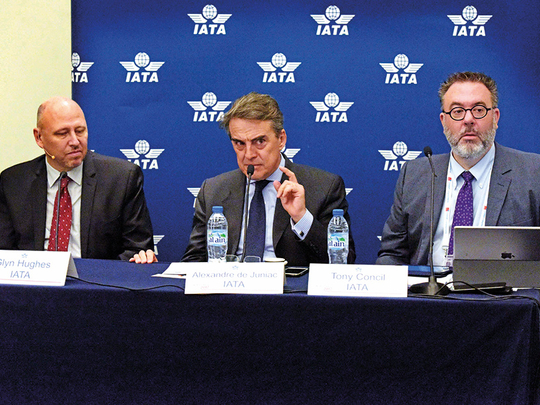
Abu Dhabi: The International Air Transport Association (IATA), a trade group of the world’s airlines, said on Tuesday it was “heavily concerned” about protectionist policies gaining momentum across the world, as such policies hurt industry and economic growth.
Alexandre de Juniac, director-general and chief executive officer of IATA, said the association is even lobbying against such policies and is in discussions with different governments about the impact they will have.
“In many parts of the world, we are seeing protectionist rhetoric progressing, meaning that we see measures taken by governments to raise barriers on borders for trade and travel. We are heavily concerned at IATA because we think it’s bad news for the industry as it is bad news for the economy,” he said at a press conference in Abu Dhabi.
De Juniac added, “IATA as an organisation strongly advocates for open borders for trade and people... and we think that [open borders] fuel growth and prosperity.”
His comments echo a similar strong sentiment against protectionism that was voiced, not only by economists at a macro level, but by experts in the aviation industry.
In February 2017, Carsten Spohr, chairman and chief executive officer of Lufthansa Group, described protectionism as a “dangerous” trend. He also said aviation companies around the world need to push the industry harder to counter protectionist movements.
IATA said that it is, indeed, working to counter protectionism movements by “relentlessly” talking to politicians and lobbying against the policies in discussions the association had with various governments, including the US administration.
In its forecast for 2017 that was released late last year, IATA cited protectionism as one of the headwinds facing the aviation industry, with the trend expected to contribute to slower growth in the industry this year.
De Juniac’s comments to reporters came after a speech the CEO delivered at the 11th World Cargo Symposium where he said businesses “must all be concerned” about protectionist rhetoric.
“Even though the year has started with some positive signs, we are still in a very tough business... More broadly, we must all be concerned about the protectionist rhetoric that is spreading. Aviation is the business of freedom. The industry is premised on borders that are open to people and trade; that is at the heart of the important role that we play in globalisation,” he said in his speech.
De Juniac added that globalisation, with the help of aviation, has played a key role in lifting hundreds of millions of people from poverty.
But while the broader aviation industry may see growth slowing down this year, it’s a different case in the cargo sector, which is starting to see some growth.
“After several years of virtually no growth, we are starting to see demand pick up. Freight volumes began to grow in the second half of 2016, and the momentum is carrying over into this year, with January demand rising nearly 7 per cent over the previous year,” De Juniac said.
He cited double digit growth in the e-commerce industry as one of the factors driving growth in the cargo sector, as well as growth in the pharmaceuticals market.
“High-value specialised cargo is showing great potential. The total global pharma market is expected to reach $1.12 trillion (Dh4.11 trillion) by 2022, creating significant opportunity for air cargo, and a substantial part of this market is the transport of temperature-sensitive health care goods,” he said.









